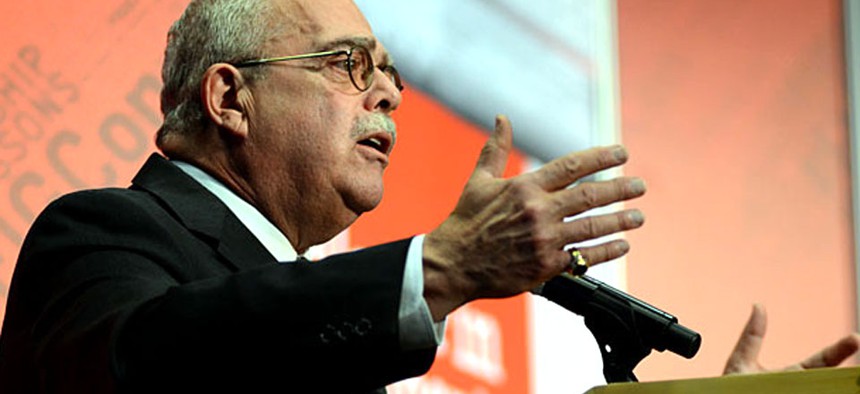Ignore Those Rumors: The White House Doesn’t Oppose IT Reform, Lawmaker says

Rep. Gerry Connolly, D-Va. Caitlin Fairchild/GovExec.com
The U.S. CIO and other officials are more supportive of reform than it might appear, according to Rep. Gerry Connolly, D-Va.
The perception among federal technology watchers that U.S. Chief Information Officer Steven VanRoekel and other officials from the White House’s Office of Management and Budget oppose a plan to overhaul government IT spending is off the mark, a co-sponsor of that bill says.
“Unfortunately, I believe a false narrative has formed in the Fed IT community suggesting that OMB opposes or has serious concerns with FITARA [The Federal IT Acquisition Reform Act], Rep. Gerry Connolly, D-Va., said in an email to Nextgov Thursday.
“In fact, based on my personal conversations with Steve, I believe nothing could be further from the truth,” Connolly continued. VanRoekel’s office has made several encouraging overtures to Connolly’s office, he said, “indicating a desire to improve our communication and foster a more collaborative relationship between us.”
Connolly cited VanRoekel’s testimony during a July 25 hearing before the House Oversight and Government Reform Committee’s Government Operations panel, as evidence of the CIO’s non-opposition. Connolly is the ranking democrat on that panel.
VanRoekel didn’t directly address FITARA during that hearing but spoke positively about some of the bill’s goals, such as efforts to raise the accountability of chief information officers at federal agencies and to reduce the stock of federal data centers.
VanRoekel’s office declined to respond directly to Connolly’s comments but also pointed to VanRoekel’s testimony during the July 25 hearing.
Connolly co-sponsored FITARA with House Oversight Chairman Rep. Darrell Issa, R-Calif. A version of the bill was included as an amendment to the National Defense Authorization Act, which passed the House in June. The bill must still win inclusion in a compromise version of the defense policy bill to be negotiated between the House and the Senate before final passage.
One of FITARA’s most significant reforms is that it would give agency CIO’s budget authority over their agencies’ IT spending, a power currently only held by the Veterans Affairs Department CIO. VanRoekel has said in the past that budget authority is less important for agency CIOs than having “a seat at the table” when major initiatives are discussed by agency leadership.
FITARA would also make agency CIOs presidential appointees.
VanRoekel told WJLA’s Government Matters program earlier this month that he’s concerned FITARA isn’t broad enough because some provisions don’t apply to the Defense Department. Connolly disputed that in his email to Nextgov.
While existing statutes would exempt the Defense Department from some elements of FITARA related to CIO authority, the department will be the largest beneficiary of FITARA reforms, Connolly said, because it’s the largest user of large, interagency contract vehicles managed by the General Services Administration.
FITARA would create new “centers of excellence” to bring added expertise to bear on these contracts.
“It is simply baffling that one could read FITARA and conclude that it does not apply to DOD,” Connolly said.






